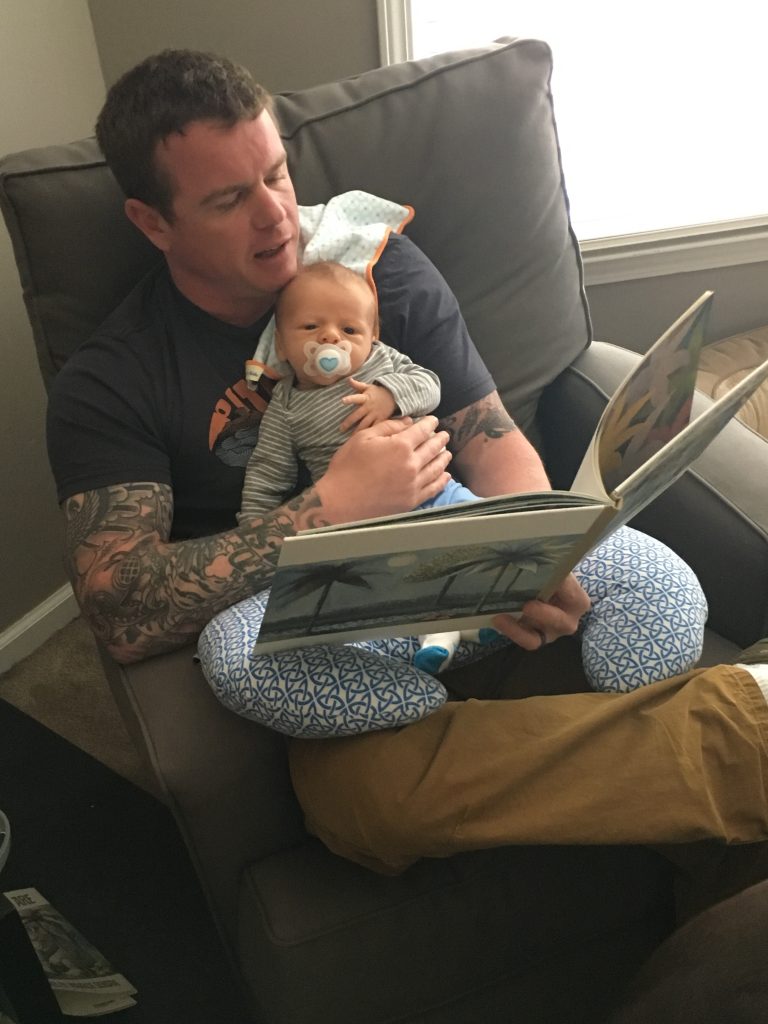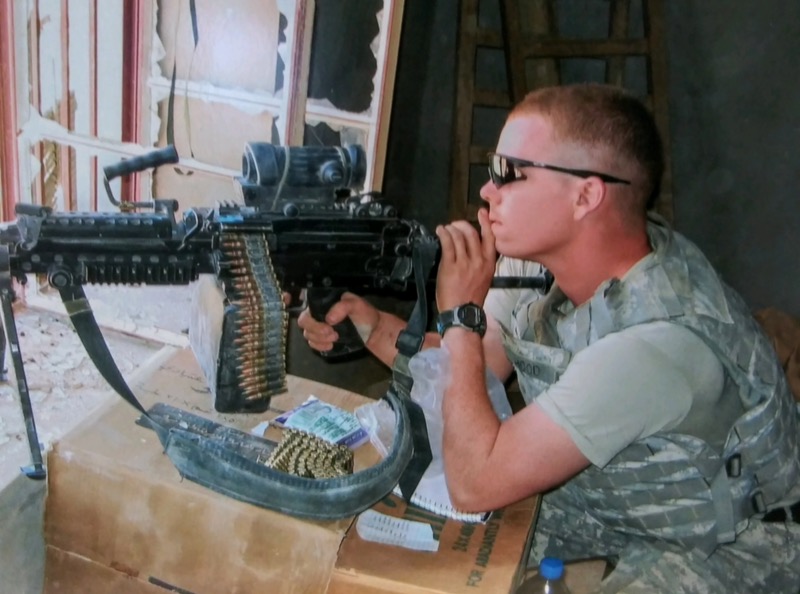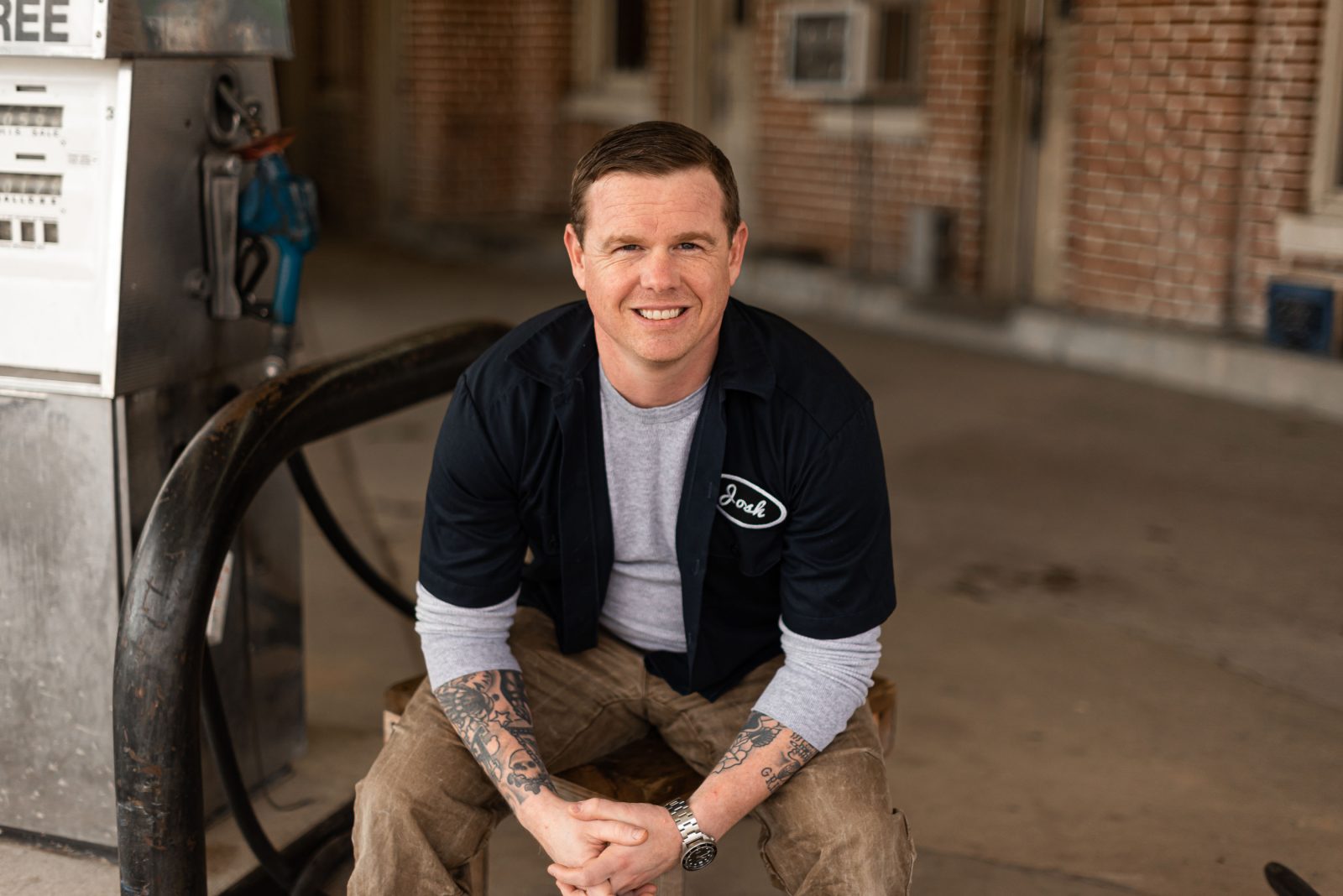The very best military thriller books, packed full of realistic action, tend to be written by those that have either served or have at least some significant experience in the area. Author turned writer Joshua Hood certainly falls into that category. He’s been that real-life hero we read about and marvel at in movies, having been involved in deeds of daring-do when fighting in the US 82nd Airborne Division and the 3-504 Parachute Infantry Regiment, leading missions in Iraq and Afghanistan.
Having left the military and his other career as a sniper team leader on a SWAT team in Memphis, Joshua became a full-time author, writing the much-loved high-octane books Warning Order and Clear by Fire. Now, Joshua has just undertaken one of his most nerve-wracking assignments, taking on Robert Ludlum’s Jason Bourne series with his new book, The Treadstone Resurrection.
It follows Adam Hayes, a former member of the shadowy CIA Black Ops programme Treadstone, now living a civilian life, who is pulled back into the dangerous world in which he used to exist after being attacked by elite operatives. It’s a gripping read that expands on the intriguing Bourne universe and gives us a new super spy to be reckoned with.
We spoke with Joshua about the daunting task of stepping in Robert Ludlum’s shoes, the preparation he did to even begin writing The Treadstone Resurrection and how his life in the military has helped inform his writing.
The MALESTROM: How did you come to pursue writing as a career?
Joshua Hood: Well, it’s kind of an interesting story. I’d always wanted to be a writer growing up. I enjoyed doing it and enjoyed reading, so it was one of those things. Some kids want to be an astronaut, I wanted to be an author. When I told my parents and other people, they kind of looked at it the same way as if I’d said I wanted to be an astronaut – “That’s cute. Are you going to get a real job?”
So I went to school and then college where I studied English, then I enlisted in the military right after graduation. For me, besides wanting to serve, I realise in retrospect I was kind of running away from writing cause I didn’t really have anything to write about.
You go to college and you study all these great works of literature and everybody felt like they had something to say, I didn’t. When I was in the military I met a guy who was actually my squad leader, Jodie Hallsworth. He used to make fun of me, “you want to be a writer like Bill Shakespeare and stuff? That doesn’t really fly in the military.”
So we went to Iraq and Afghanistan, I got out and hadn’t really thought much about writing for around a year. Then one day I got a call from him, it was real short and sweet. He was asking what I’d been up to and he told me he’d just graduated with a master’s degree in fine art and English and had just published his first book!
More than anything that was the impetus, I was like if this guy can do it, and no offence to him, then I can. So I hung up the phone, went upstairs and grabbed my laptop.
TM: Tell us about writing your first book, what was the process with that one?
JH: Everyone says write what you know. I was fresh out of the military and the last place I’d been was Afghanistan. There was one day on duty where I was listening to the radio in the Helmand River Valley while we were working with the British. Someone was trying to call in an Apache to do an airstrike.
The pilot was saying, “I can’t do that as I can see some people in this compound.” So he would move out of the way and then the Taliban would come out and start shooting, then the helicopter would come back and the same thing kept happening.
I started thinking what would happen if you had this character who was American or British, someone from the West, that was able to blend in on the ground within an area like that, who could handle that situation that way. The idea stuck with me and I used that nugget to build my first book around.
At the same time, one of my favourite books is Heart of Darkness by Joseph Conrad. I’ve read that book probably forty times, every time I read it I learn something new. At first, it’s just a story but then you start digging into it and finding out who he was.
I went to college and studied older literature and it appealed to me to take something deep and meaningful, something that’s in the news, and meld it with this little story and people might take something away from it.

TM: Do you think it gives you an advantage over other writers within the genre, the fact you’ve actually seen serious action?
JH: For me, writing the action is very easy. Having been in the military over in Iraq and Afghanistan and as a cop for eight years after that, it gives me some strengths. We’ve all seen movies where people are fighting and killing each other, but it’s just a movie, we’ve become desensitised to violence.
But having been there and known these people, it gives me the ability to ask, what is the price of that? These things aren’t for free? And it gives me an insight into these characters that I believe offers something fresh. They’re people, right? That’s what we’re reading about. Yet it’s an escape.
No one wants to read about doing taxes, we want to read about these superheroes and I think I’m able to bring a human element to it. I hope that connects the reader more to the characters.
You look at society and we export violence, that’s accessible now. I think one of the roles of a writer is to be a mirror. Maybe if you’ve lived in the same town, in the same country all your life you might only know what people tell you. You might think you’re the best in the world, but then you go somewhere else and things are different and people think differently.
So that’s one of the things I try and do. If you can write a book that makes people question things, so this character is really bad and the things he does are really bad, but then the reader can still connect that to things they see in their life, it might give them some food for thought.

TM: The Bourne universe is so well known. Did you feel the pressure when you were asked to take on this new book?
JH: I did. You see big sporting events like the World Cup where a player has to take a penalty kick, these guys have done these things their entire lives, so you think to yourself they’re probably not nervous. But on a big stage, not just in a league game, but the World Cup, I don’t care who you are, I’m pretty sure you’re nervous. That’s kind of the way I felt.
Just me writing my books as I have, I was never nervous, but this is Robert Ludlum. I felt a real weight on me, I didn’t want to mess this up. Luckily there’s so much content with the books and the movies, so that really helped me out because I was able to go back in there and look at how the movies took what the book was and then make it into something modern starring Matt Damon.
How did they do that and make it gripping? I got to do the opposite. I knew that it needed to be modern and it needed to be fast, as I assumed most people would think of Matt Damon and his imprint on the movies. I was able to do some of that, but the hardest part for me was that there was nothing really out there about Treadstone.
For me that was exciting but it was also difficult because with Jason Bourne, the movie begins with him about to kill this guy, then he sees that he has a kid in his lap and then he gets shot and can’t remember. But for me, I’m looking at the guy and thinking he’s a bad person, he gets paid to kill people.
What they were able to do successfully and Ludlum did brilliantly was the fact Bourne couldn’t remember and he realises he used to do these bad things but he wants to change and he becomes likeable. I didn’t have that option, because the character I wrote, Adam Hayes, he would know what he did. So the biggest thing I wrestled with is how do you make someone who kills other people for a living likable?
TM: In the book, Adam Hayes has a family. Was that a decision you made to humanise him?
JH: It was. I spent almost eight years on a SWAT team in Tennessee and a year and a half before they asked me if I wanted to write Treadstone, my wife and I had our first child. Literally the first day I held him I knew I couldn’t be a police officer anymore. I couldn’t bring this trash home to him. So I quit.
Having a child literally changes everything, especially the way you look at life. So when they asked me would I like to write this my first thought was, in the movies, Treadstone has been closed down, so I was thinking what happened to these guys?
What happened in their life? You’re an assassin and you’ve been one for however long and it took all this time and then when they just closed down, I’m pretty sure you don’t get health benefits and all the rest, so what have you done for the past 20 years? I found it fascinating to think about that.
What if this guy had a family and left Treadstone wanting to be normal? But he really can’t be. He would likely have some kind of post-traumatic stress disorder and a lot of other things going on. Once I started thinking about that, the story just started to come out about this man with a family who had done terrible things in his past, but wanted to find redemption.

TM: What preparation did you do for the book? Was it a case of reading everything and watching all the movies first?
JH: Once I had the idea of, ok, you’re going to need to write a book from a Treadstone person’s perspective, then I literally started immersing myself in this world. Reading the books, watching the movies, looking for little points I could connect to.
Ludlum goes into a lot more detail in the first Bourne book about where this guy came from and how the training would work. He was in Vietnam, so I started studying a lot about Vietnam to see if there were people like this that really existed in the CIA, etc and there were.
Then I found a little snippet about MK Ultra, this CIA mind control program, and I started to wonder whether that’s where Mr Ludlum had got these ideas from? That led me to look for interviews where he’d talked about where he got some of these ideas from and what his process was.
I tried to get into his headspace. I also looked at the Cold War period and shifted it to now, thinking about the war on terror and also melding that with the technology that we have. That’s the main preparation I did, lots of research.
TM: Did you have an actor in mind when you were creating the character? Like a Matt Damon type?
JH: I like to brush in as much of the character as I can. But if I’m thinking Matt Damon and someone else hates Matt Damon… I like to give the reader just enough so they can put themselves into that character and also see him as they see him. That’s what I like about certain books, that you can see yourself as that character in a way.
TM: Going back to your former career. How did your real-world experience of combat training and service in the army creep into this particular book?
JH: One of the things about writing combat is I’ve been in a lot of situations over the years that you could use in a book. You think back to what it felt like to get shot at? What did it smell like when someone fired a mortar at you? What do the blades of a helicopter feel like? I was able to connect on those.
When you know what it’s like to be terrified, tired and hungry, you can write about what it felt like to me. That’s where I’ve really tapped into my experience. Whether it be the way a gun sounds when it’s being shot in the open or whatever it might be. It allowed me to bring some realism and feeling to the book.

TM: I have to ask, who do you think would win between Adam Hayes and Jason Bourne in a fight?
JH: Wow. For me personally, I think Adam Hayes has more to lose if that makes sense. Jason Bourne has lost his family, he’s trying to do the right thing, but wants to be left alone. Whereas I believe Adam Hayes has more to fight for, more to lose. That’s why he refuses to roll over and die.
TM: What do you hope readers take away from your book?
JH: I hope they enjoy it. I hope they realise how much work and how many sleepless nights went into it. I also hope they accept it as part of this universe, that’s a big thing.
I don’t want that acceptance from me personally, but I hope they accept Adam Hayes in this Bourne, Treadstone, Ludlum world, that he fits seamlessly in and they give me the opportunity to explain him and unpatch him a little bit more.
It’s a bit like when I was first dating my wife and I showed up at Thanksgiving with her whole family their thinking, who’s this guy? After five or ten Thanksgivings you’re one of them, but that first one you’re thinking this is kind of uncomfortable, no one likes me.
TM: We like to finish by asking for some wisdom or a mantra you’ve lived by. Does anything come to mind?
JH: I’ve learned the hard way that nothing beats hard work. So many people said I could never do this. I could never be a writer, I could never be an astronaut, I could never be a business person.
Whatever excuse there might be. I was in that same boat, I had a dream, but it took somebody else getting off the couch and doing it and showing me what they had done to make me realise you can do anything you want to if you’re willing to put in the work and if you’re willing not to take no for an answer.
Robert Ludlum’s The Treadstone Resurrection by Joshua Hood, published by Head of Zeus is out to buy now.
Find out more about Joshua at: https://joshuahoodbooks.com/

Click the banner to share on Facebook



